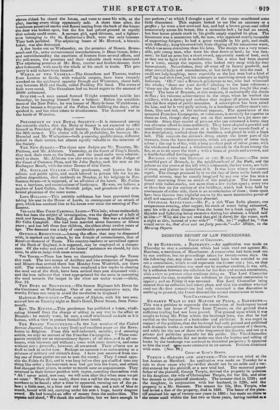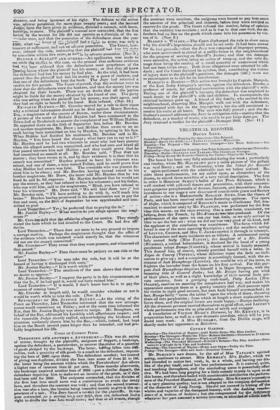DIGESTED REPORT OF LAW PROCEE.DINGS. COURT OF CHANCERY.
IN RE HARRISON, A BANKRUPT application was made ea Thursday to stay a commission which, had been sued out against Mr. Harrison, a merchant, of Manchester.- A commission had been sued out by one creditor, but no proceedings taken the tweaty-seveo v On the following day, any other 'creditor would have been entitled to sae out a commission, which would supersede the former one ; but, on th., day, another commission was sued out by another creditor, it was said, by a collusion between the solicitors for the first and second commission, with a view to prevent other creditors doing so. The Lord Chancellor postponed the case, to enable the solicitors to the second commission to appear ; and on Friday it was resumed. The Lord Chancellor being assured that no collusion had taken place, and that the creditor who had sued out the first commigsion had only exercised a. due discretion in omitting to proceed; the Court directed the second commission to issue.
Vies-CFI.; NCELLOR'S COURT.
EX-PARTE WRAY IN THE MATTER OF PRICE, A BANKRUPT.— printer and publisher generally for the public. The Vice-Chancellor observed, the affidavits did not make.out that the buying and selling of to him the trad: sovas more extensive in its nature. Petition dismissed with costs. (Nov. It) sought to bring Mr. Price within the bankrupt laws, was that he had carried on the business of a bookseller and publisher. It was urged in support of the petition, that the bankrupt had only printed and published Such dramatic works as were incidental to the management of a theatre, and solely for the use of those who frequented the theatre, and not as a books by the bankrupt was confined to theatrical purposes ; it appeared. against the late lessee of Drury Lane Theatre, on the ground theta sufficient trading had not been proved. The ground upon which it was This was a petition to supersede the commission of bankruptcy issued
COURT OF K)NG'S BENCH.
TUE P/N v. GAHSSEN. AND ANOTHER.—This case was tried at the last Assizes at Hertford. An application was made on Tuesday for a rule to show cause why the verdict should not be set aside and a ver- dict entered for the plaintiff, or a new trial had. The maternal grand- father of the plaintiff, George Turpin, devised the property in questios. to his daughter, the wife of Christopher Turpin, for her life, and after her decease to the plaintiff absolutely. The testator died in 1703; and the daughter, in conjunction with her husband, in 1795, sold the property to a Mr. Gaussen. The tenant for life, Mrs. Tnrpin, who had levied a fine of the property, died in 1801. The lessor of the plaia, tiff attained his age of twenty-one years in 1805; but made no claim tis the estate until within the last two or three years, having resided ate distance, and being ignorant of his right. The defence to the aCtion was, adverse possession feta more than twenty. years ; and. thnlitarned Judge; Upon the facts given in evidente,.direeted a nonsuit, with leave, to mpve The plaintiff's counsel now contended, that the fine levied by the tenant.. for life di& not operate as ndisseisin,ot the re- ---5.isnler man, and that the poSsession of the defendants since the veer 1005; Whetrtaa' lessor of gliii..1:!4ittiff: had arIg:itc- to enter; was only a tenandy at sufferance, ltna not on adverse possession. The Court, how- ever, refused the title, intimating that the plaintiff haul l n
by non-claim within live years w& adverse poSseSsion.'(Nov.'il.)
DUFOUR V. ACE:LA,ED oTnEsts.—Aa application WES SESAE to !set aside the vez.'dlet in this case, on the ground that sufficient evidence had Jti.;t beer adduced that the defendants were proprietors of the miag-,hense where the plaintiff lost his money, or that they all knew the defendant 'had lost his money by foul play. At the trial, it had been proved that the plaintiff had lost his money at a game of roulette“md thatbne of the defeedaftts kept-the bank: The Jury had returned a verdict for .fiVe pounds. The Court observed; that the evidence went to
show that the defendants -were the bankers, and that the money lost was obtained for their' benefit: There was no doubt that all the :Parties might be liable for the money obtained by the fraud of one: . The party who was acting when the plaintiff lost his money, was their agent, and they had ne right to benefit by his fraud. Rule refused. -(Nov. le.)
EX--PARTE HA irnox.--LMr. Crowder Moved for a rule to slioiv Cause why,a criminal information should not be filed against Henry: Bowden, Esq., a Magistrate of -the. county of Devon, under these circumstances. A person of the name of Richard Hayden had been summoned to the Town-hall at Bradninchto answer the complaint of one William Malden. He appeared there on the 15th of September last,.before Mr. Bowden and another magistrate, Mr. Drew ; and Meldon then swore to an as- sault having been committed on him by Hayden, by spitting in his face. When Mahlon bad finished his statement, Mr. Bowden said to Mr. Hayden, " You have heard the charge; what have you to say toit ?" Mr. Hayden said he had two witnesses in court who had been present when, the alleged assault was committed, and who had seen and heard all that passed between him and Maiden; and they would prove that he had comthitted no assault' at all. Mr. Bowden said, "That diet 'rot matter ; they have sworn to it, and by their evidence, it is clear that an assault was committed." Hayden pressed to have his witnesses exa- mined, and one of them, a *man named Follett, Said he could prove that what Maldon had sworn was false.' The constable who was present de, sired him to be silent; and Mr. Bowden having turned round to his brother magistrate, Mr. Drew, the latter told Mr. Hayden that he was fined 5s. and 2s. Cd. expenses. Mr. Hayden declared that he would not pay the money, as they had refused to hear his witnesses ; and his father, who was with him, said to the magistrates," Mind, you have refused to bear his witnesses." Mr. Drew Said, "We will hear them now ;" but - Mr. Bowden Said, " haVeaothing to -do with, it, well teach him better." Hayden having persevered in.his.determination not to pay the fine and costs, on the 25th of September he was apprehended and -com-
mitted to gaol ' — • ••..,:
Lord Mate:Men-7" Ves he preferred that to paying the 5s." Mr. Mr. JustiCe Dayley--" *hat motive 'do you allege against the .megi-
strate ?" ' . Mr. CroWdek,"aid that. tile affidavit& alleged no motive. They Merely stated the facts which he had detailed to the Court. He had five affi- davits.
Lord Tenterden—" There does not seem to be any ground to impute a corrupt motive. Perhaps tho magistrates thought that, the effect of the evidence which was tendered would merely be, that the witnesses did not see the assault committed."
Mr. Crowder---;". They swear that they were present, and witnessed all that passed." Mr. Justice Bayley—" Then there must be perjury on one side-or the other."
Lord Tenterden—" You may take the rule, but it will be at the hazard of having it discharged. with costs."
Mr. Justice Bayley—" Is it worth while ?." Lord Tenterden—" The smallness of -the sum shows that there was no desire to oppress."
Mr. Justice Bayley—" I suppose the party is in fair circumstances, so that the 7s., if lie had paid it, would not have ruined him.". Lord Tenterden—". If it would, I don't know how he is to pay the:
expense of coming here." • Mr. Crowder at length said, he would consider whether or not it would be worth while, to take the rule. (Nov. 0.)
RETIREMENT OF Mn. J UST ICE RAYLEY.—At the rising of the Court on Thursday, Ldial Tenterden intimated that the new arrange- ments would commence' On Friday ; :and at the same time informed the Far, that Mr. Justice Bayley was about to resign. Mr: Brougham,. on behalf of the Bar, addressed his Lordship with affectionate respect ; and the venerable Judge shortly replied, acknowledging the kindness and attention uniformly shown him by the Bar,—which, indeed, had .kept - Lim on the Bench several year longer than he intended, and had,pro-
bably lengthened his fife.. .
COURT OF COMMON PLEAS. ' -
TREGONING .A*M AmoTarre i. ATTENEERY.----ThIS WIWI/71;300R of trover, brought by the plaintiffs, asSignees of Soppett, a bankrupt, against the. defendant, a pawnbroker' to recover theavalue ola quantity cf goods pledged by the bankrupt. The latter, hAng fallen into diffi- culties, took a quantity of silk goods in .a coach to the defendant, requests inT the loan of 2001. upon them. The defendant acceded ; but instead of giving one duplicate, divided the loan, into sums of from 2/. to 10/. the letter being the amount within which the Pawnbrokers' Act allows a higher rate of interest- than Si. per. cent. Three months afterwards,. the bankrupt ,received another loan of 2001.aipon a,similar. deposit, the., defendant requiring him to make out an, invoice of the goods' as if they. bad been sold for 2001. The assignees contended, that thedivisien ok. the first. loan into small sums was a. contrivance to evade the tisttey laws,,and therefore the contract was void ; and that the second transac.., thin w.aselso a loan, the invoice being. intended merely to give it -the pearance.of a sale. The jury-found a verdiCt (,r the plaintiffs. -Itwis. new contended, on a motien.f.or,u rev that the. defendant hail-krt.- iance _a weirs:an:of fashion ; but she compensated -for the- defipency right to dive•the loan into Small sums ; and that at all eisents,theugit wherierer her part assumed a serious interest, or admit/AA:0 afiscie vf4c4-.
• ,
the contract were usurious, the assignees were bound.topay into court the amount of the. principal and. interest,: before they were entitled to recover for the goods. The Court refusett the reotioni.beingef opinion. that the contract ivas usuriptis • and as it. was in that case void, the de- fendant had no lien en the gods whichearrie into his possession by lir. • tue Of it. (Nov. 0.)
• . ,
. - BLISSET v. IVILiow.—The Court discharged the rule to show cause why the sheriff's inquisition should not be set aside. It tad ,been- moved for 611 twi.) grthintiS,—that the Jury was composed of improper persons, who were accustomed to attend - at a public-house in the neighbourhood - for the purpose of serving on Sheriff's Juries; ,and that time :damages were excessive, the action being an action of trespass, -and the only da. mage done being the cutting of a small quantity of-underwood which had not been taken away.. Both these allegations were rebutted by affi- davit ; and the Court declared its opinion that, considering the nature of injury done to the plaintiff's premises, -the- damages (501.) 'were not so extravagant as to call for its interference. • MARQUIS V. BROOKS.—This action was brought by Captain Marquis, of the East India Company's service, against the defendant, Brooks,ai professor of music, for criminal conversation with the plaintiff's wife. Duripg one of, the. plaintiff 's. voyages, theeletendant was employed to teach music to the plaintiff's wife and children. In- consequence, the criminal intimacy grew up. A friend of the- family, who resided in the neighbourhood, observing Mrs. Marquis walk out with the defendant, remonstrated with her on the impropriety ; but she still continued to
receive visits at all hours. The case was fully proved ; and the-de- fendant's counsel addressed the Jury in mitigation only—stating that the defendant, as a teacher of music, was unable to pay large damages. The Jury returned a verdict for the plaintiff—Damages 2001. (Nov. 11.)



























 Previous page
Previous page